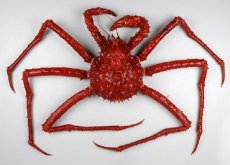New publications
Global warming has led to a crab infestation of Antarctica
Last reviewed: 30.06.2025

All iLive content is medically reviewed or fact checked to ensure as much factual accuracy as possible.
We have strict sourcing guidelines and only link to reputable media sites, academic research institutions and, whenever possible, medically peer reviewed studies. Note that the numbers in parentheses ([1], [2], etc.) are clickable links to these studies.
If you feel that any of our content is inaccurate, out-of-date, or otherwise questionable, please select it and press Ctrl + Enter.

King crabs, a crustacean of the same species as red king crabs, have been found on the edge of Antarctica. Scientists believe the animals were brought to Antarctic waters by warming temperatures in the region.
Their large population has been discovered on the southern side of the Antarctic Peninsula, in a depression formed in the continental shelf, scientists report in the journal Proceedings B.
As the authors of the material suggest, the crabs arrived in Antarctica with warm currents.
Given that crabs tend to eat other seafloor inhabitants, their arrival could significantly change the Antarctic ecosystem, researchers warn. In Search of Life
Last March, researchers sent the Genesis submersible, controlled remotely from Ghent University in Belgium, to Palmer Land.
The group of scientists planned to examine the area for living organisms. The team was not specifically looking for crabs and was extremely surprised to find such a large number of large specimens.
Scientists estimate that there may be around 1.5 million king crabs in the basin.
The researchers found mature eggs and larvae in the female they extracted from there.
King Crabs
Crabs could live in Antarctica for 30-40 years
"We suspect that there was an incident - and perhaps more than one - where the shelf was covered by a stream of warm water, which carried crab larvae into the basin," said the leader of the research team, Professor Craig Smith from the University of Hawaii.
It is believed that king crabs cannot live at temperatures below +1.4 C.
The sea temperature in the Antarctic region is higher in deep water than near the coast, and crabs have only been found at a depth of 850 meters.
According to scientists, the crustaceans settled there no earlier than 30-40 years ago. Before that, the water was too cold for them even at the very bottom of the depression.
Currently, crabs cannot survive on the continental shelf, which is 500 meters deep, but this could change.
"Given the rate at which the sea is warming, water temperatures at continental shelf level will jump above 1.4C within 20 years, and crabs will then likely move into shallow waters," Professor Smith told the BBC.
Predators
The 850-meter mark, above which crabs do not venture, is also the boundary separating the rich ecosystem of shallow waters from the fauna of the deep sea, which is very limited in composition and number of inhabitants.
"Above the 'crab zone' the flora and fauna were more diverse and abundant, with echinoderms including brittletails, sea lilies and sea cucumbers," says Professor Smith.
"We didn't find any of this in the crab habitat itself, or 50-100 meters above it. Therefore, we believe that the crabs are making forays into shallow water to feed themselves. We admit that some of these organisms will eventually die out because of the crabs," the scientist added.
Previously, scientists had already suggested that king crabs would at some point settle in the Antarctic region, where they would be carried by warm currents from South America.
The distance between the tips of the king crabs' claws is almost a meter. They are considered one of the top predators of the seabed.
There are about 120 species of these crustaceans, and the most common of them, the red Kamchatka crab, has already affected the ecology of Norwegian waters, where it came from Russia. At the same time, in northern latitudes, the Kamchatka crab has become an important object of fishery.
King crab fishing will not be allowed in Antarctic waters, although it could be used to control population numbers if its impact on the ecosystem proves too negative, Professor Smith said.

 [
[